 Image from Google images.
Image from Google images.Wednesday, December 6, 2017
Henry Louis Gates Jr. Africa's Great Civilizations
Dr. Henry Louis Gates Jr. has partnered with pbs/KQED to create a six episode series titled Africa's Great Civilizations. The series begins with the origins of mankind and takes the viewer on a journey through the history of Africa all the way to the beginning of the 20th century. The series is not exclusively from a European perspective, it contains insights from African historians who specialize in the field of African history. Admittedly, I only watched the last two episodes "The Atlantic Age" and "Commerce and the Clash of Civilizations".
 Image from Google images.
Image from Google images.
 Image from Google images.
Image from Google images.Thursday, November 30, 2017
Where will the Mugabes live?
Mugabe, the recently ousted Zimbabwean President, may continue to live in Zimbabwe. According to The New York Times, which quotes Mugabe's spokesman as saying "He's Zimbabwean, Where else would he live?"(Onishi, The New York Times).
After Mrs. Mugabe and her political allies tried unsuccessfully to eliminate her political rival, Mr. Mnangagwa and the military, she and her husband were placed under house arrest. Many Zimbabweans are reluctant to vilify their former President because of his political legacy of being their first President, but they do not hold back their blame and criticisms for Grace Mugabe, who is known for frivolously spending money on luxury items, earning her the name of Gucci Grace, as written by BBC news. Also, The New York Times states that "the Mugabe's are believed to have accumulated vast wealth in Zimbabwe as well as in the Middle East and Asia"(Onishi, The New York Times). Therefore he may move to one of those two regions, if he and his wife are not granted immunity. However, as of now, he remains in Zimbabwe.
 Mugabe at a security meeting, The New York Times
Mugabe at a security meeting, The New York Times
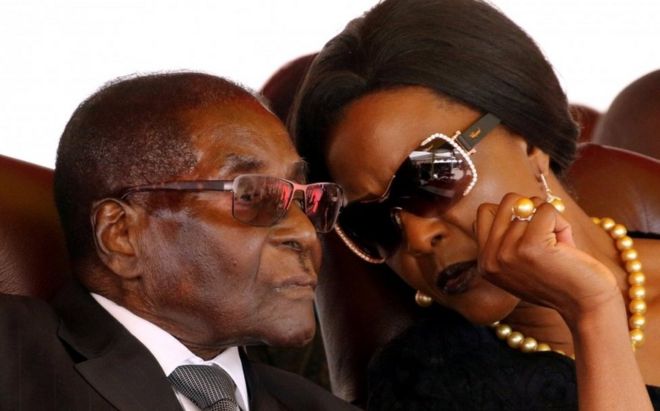 The Mugabes, BBC News
The Mugabes, BBC News
http://www.bbc.com/news/world-42108646
https://www.nytimes.com/2017/11/23/world/africa/zimbabwe-mugabe-mnangagwa.html?rref=collection%2Fsectioncollection%2Fafrica&action=click&contentCollection=africa®ion=stream&module=stream_unit&version=latest&contentPlacement=8&pgtype=sectionfront
After Mrs. Mugabe and her political allies tried unsuccessfully to eliminate her political rival, Mr. Mnangagwa and the military, she and her husband were placed under house arrest. Many Zimbabweans are reluctant to vilify their former President because of his political legacy of being their first President, but they do not hold back their blame and criticisms for Grace Mugabe, who is known for frivolously spending money on luxury items, earning her the name of Gucci Grace, as written by BBC news. Also, The New York Times states that "the Mugabe's are believed to have accumulated vast wealth in Zimbabwe as well as in the Middle East and Asia"(Onishi, The New York Times). Therefore he may move to one of those two regions, if he and his wife are not granted immunity. However, as of now, he remains in Zimbabwe.
 Mugabe at a security meeting, The New York Times
Mugabe at a security meeting, The New York Times The Mugabes, BBC News
The Mugabes, BBC Newshttp://www.bbc.com/news/world-42108646
https://www.nytimes.com/2017/11/23/world/africa/zimbabwe-mugabe-mnangagwa.html?rref=collection%2Fsectioncollection%2Fafrica&action=click&contentCollection=africa®ion=stream&module=stream_unit&version=latest&contentPlacement=8&pgtype=sectionfront
Wednesday, November 15, 2017
Pre-natal Care
In an effort to encourage women to have more pre-natal visits and receive pre-natal care like, "early treatment for H.I.V., syphilis, and high blood pressure, as well as vaccines like tetanus and vitamins like folic acid" (The New York Times, McNeil). Throughout a woman's pregnancy living in a rural community, she will consult a traditional healer. Bridge to Health Medical and Dental, a medical charity, is hoping to persuade women to visit their free clinics by offering ultrasounds where women would be able to see their babies. In an effort to make the ultrasounds more portable, the doctors hope to obtain scanners that plug into smartphones that would project the images onto their phones and then also connect to printers, so the women can take picture home with them.
When reading this article, I found it to have a Western bias. For example, the way in which the women in Uganda were being described was very primitive. The women were portrayed in a generalized way as being poorly educated and that the only way they would go to the clinics is if they were told that it was magic. The subject of this article about pre-natal care was interesting, but the language and tone of the article was a bit simplistic and ethnocentric towards the female patients.

https://www.nytimes.com/2017/11/10/health/africa-clinics-ultrasounds-women.html?rref=collection%2Fsectioncollection%2Fafrica&action=click&contentCollection=africa®ion=stream&module=stream_unit&version=latest&contentPlacement=2&pgtype=sectionfront
When reading this article, I found it to have a Western bias. For example, the way in which the women in Uganda were being described was very primitive. The women were portrayed in a generalized way as being poorly educated and that the only way they would go to the clinics is if they were told that it was magic. The subject of this article about pre-natal care was interesting, but the language and tone of the article was a bit simplistic and ethnocentric towards the female patients.

https://www.nytimes.com/2017/11/10/health/africa-clinics-ultrasounds-women.html?rref=collection%2Fsectioncollection%2Fafrica&action=click&contentCollection=africa®ion=stream&module=stream_unit&version=latest&contentPlacement=2&pgtype=sectionfront
Wednesday, November 8, 2017
A Family Reunited
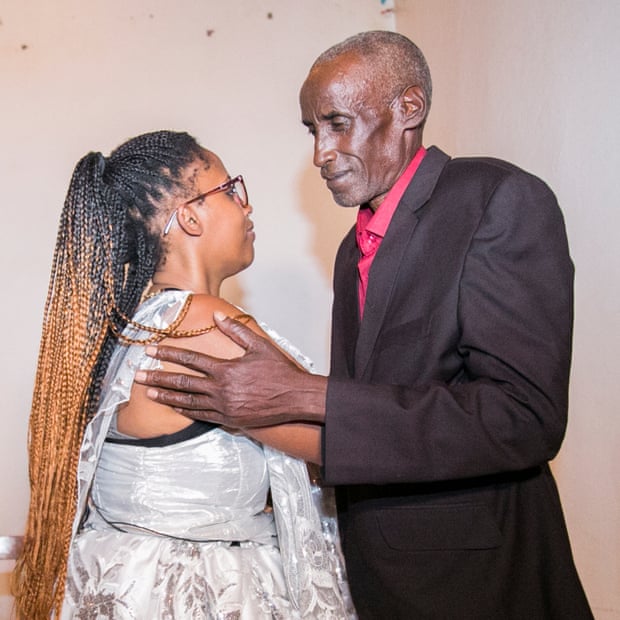
During the 1994 Rwandan Genocide Jeanette Chiapello, her birth name being Beata Nyirambabazi, was thought to be an orphan when she was found alive among 10,000 dead at the Nyamata Catholic Church. That church is now a genocide memorial site. At the time her father and mother took rufuge at different sites; her mother took Jeanette, her twin sister, and brother, while her father went with her other three siblings to a different location. Jeanette's mother and siblings were among the Tutsi that were killed by the Hutu.When her father, Sebarinda, learned of the tragedy he went to the orphanage, but had to leave her there while he thought of a way to get her back. Unfortunately, Sebarinda was never able to get her back because she was sent to Italy to be adopted.
For twenty-three years the pair were separated, but after ten years of searching by Jeanette's brother, and repeated denials by Jeanette, the family was reunited which was confirmed by a DNA test. She and her husband were welcomed by a traditional ceremony in the district of Bugesera.
https://www.theguardian.com/global-development/2017/oct/31/father-finally-reunited-with-daughter-lost-in-chaos-of-rwanda-1994-genocide
Wednesday, November 1, 2017
Nuclear Power Plants in Nigeria
Within the next couple of years, construction of nuclear power plants in Nigeria will begin in an effort to end it's energy crisis. The nuclear plants are being sponsored by a Russian state-owned company, Rosatom, after a deal was reached between the two countries that is estimated to be worth upwards of $20bn. Because of corruption in Nigeria the World Bank estimates that as of 2014, 40 percent or more of the population has had no electricity. Although Nigeria has an immense amount of oil, the wealth that the oil has created has been wasted, according to the BBC article. The plants will initially be controlled and operated by Rosatom before being handed over to the Nigerians. Currently Rosatom is in talks with Ghana and South Africa to fund similar plants.
%20460.jpg)

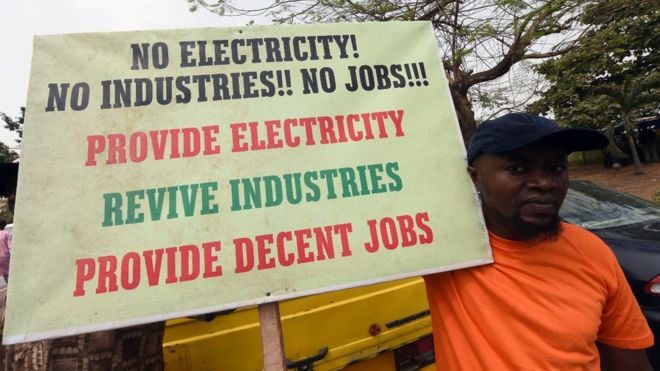
http://www.bbc.com/news/world-africa-41818933
%20460.jpg)


http://www.bbc.com/news/world-africa-41818933
Wednesday, October 25, 2017
Chocolate Sourced from Ghana and Ivory Coast
Mighty Earth, an environmental group, has recently shed a light on the illegal chocolate plantations that are popping up throughout Ivory Coast and Ghana in an article on the Christian Science Monitor. According to the article "almost one-third of 23 protected natural areas in Ivory Coast that researchers visited in 2015 had been almost entirely converted to illegal cocoa plantations" (CSM, Anna Pujol-Mazzini). Also, within the national parks these plantation's economies are being supported by thousands of people that are establishing schools, churches, and whole villages. Although cocoa plantations are sponsoring community building, they are also contributing to climate change because the trees of the forest that help to absorb carbon dioxide are no longer there, and the wildlife like elephants, hippos, and chimpanzees are being threatened.


https://www.csmonitor.com/World/Africa/2017/0914/Legally-sourced-chocolate-could-help-end-deforestation-in-West-Africa


https://www.csmonitor.com/World/Africa/2017/0914/Legally-sourced-chocolate-could-help-end-deforestation-in-West-Africa
Wednesday, October 11, 2017
Afican Donkeys
Donkeys in Africa are essential for transportation and farming, especially for poorer communities. Donkeys are companions too which is demonstrated by the story of Anthony Maupe Wanyama, a water deliveryman from Kenya, who had his donkey named Carlos stolen from him in the night. When Anthony found Carlos his skin had been removed and he was dead in the street.
In China the demand for donkey skin is huge, for they are used in health foods and medicinal purposes. The author of the article, Alastair Leithead, includes a statistic that "China's donkey population dropped from 11m in 1990 to 3m today, based on government data"(BBC, Leithead). Donkey skin in Africa can be sold for $388 per kilo. Therefore, the number of donkey's being stolen has increased and at least 150 donkeys are slaughtered at slaughterhouses a day.
In addition to Anthony, many other families have lost their only source of income and can no longer afford day-to-day expenses. The impact of the demand for Donkey hide has affected Africa so badly that "countries including Uganda, Tanzania, Botswana, Niger, Burkina Faso, Mali, and Senegal have banned China from buying their donkey products"(BBC, Leithead). Unfortunately, despite being banned from their main source of donkey in Africa, China has now turned to places like Peru and Brazil, to satisfy their cravings for donkey.
http://www.bbc.com/news/world-africa-41524710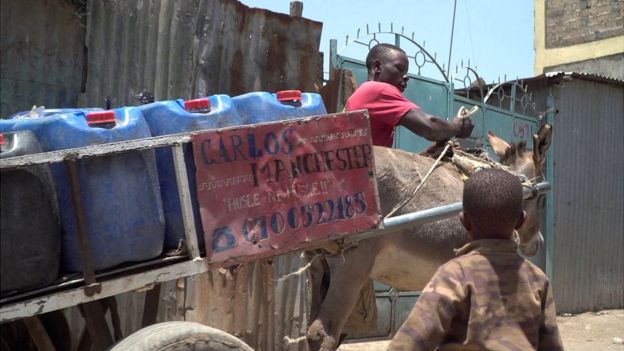
In China the demand for donkey skin is huge, for they are used in health foods and medicinal purposes. The author of the article, Alastair Leithead, includes a statistic that "China's donkey population dropped from 11m in 1990 to 3m today, based on government data"(BBC, Leithead). Donkey skin in Africa can be sold for $388 per kilo. Therefore, the number of donkey's being stolen has increased and at least 150 donkeys are slaughtered at slaughterhouses a day.
In addition to Anthony, many other families have lost their only source of income and can no longer afford day-to-day expenses. The impact of the demand for Donkey hide has affected Africa so badly that "countries including Uganda, Tanzania, Botswana, Niger, Burkina Faso, Mali, and Senegal have banned China from buying their donkey products"(BBC, Leithead). Unfortunately, despite being banned from their main source of donkey in Africa, China has now turned to places like Peru and Brazil, to satisfy their cravings for donkey.
http://www.bbc.com/news/world-africa-41524710

Wednesday, September 27, 2017
Mandatory Respect for the Flag
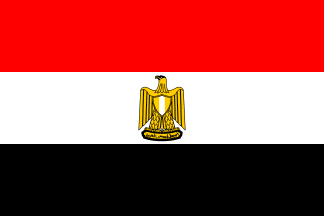
In an effort to increase patriotism in Egypt among the youth, specifically the students, the Egyptian education minister has required "students to respect the Egyptian flag or risk jail time" (Michaelson, the guardian). According to the article, respect for the flag is shown by saluting the flag. Desecrating the flag had already been criminalized in 2014 by the former President, but this new order explicitly calls out students.
Students, in recent history with the 2011 revolution, demonstrated how powerful their voices are in standing up for democracy. In fact, Ruth Michaelson states in her article that "universities were considered sites of protest after the 2011 revolution, which swept autocrat Hosni Mubarak from power" (Michaelson, the guardian). Many young people have been detained since this policy has been enacted, and the total of detainees is 40,000.
Egyptian students, and all students for that matter, are capable of creating so much positive change. The Egyptian government recognizes that which is evident by their "decision to remove teaching about the popular uprisings of 2011 and 2013 from the Egyptian curriculum prior to this academic year" (Michaelson, the guardian).
This article's title grabbed my attention not only because we, the U.S., are in the middle of a political dialogue concerning our own flag, but because students are risking their freedoms and financial gains, in order to stand up for what they believe in.
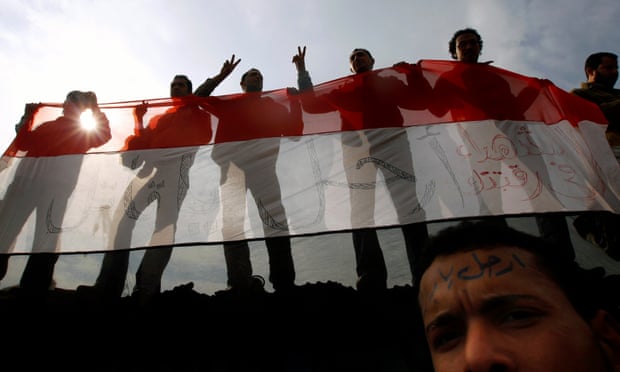 https://www.theguardian.com/world/2017/sep/25/egyptian-students-respect-flag-risk-prison
https://www.theguardian.com/world/2017/sep/25/egyptian-students-respect-flag-risk-prisonThursday, September 21, 2017
Chocolate from Ghana
Tim Gossling from the gaurdian wanted to answer the question asked by Anna Jones "why can't the chocolate be made in Africa?" (Tim Gossling, the guardian). He found a cocoa processing company in Ghana that makes additive free chocolate. The only problem is that what ex-colonies can export is very limited to only "primary produce" as Gossling puts it. Also, those products must be tariff free.
Post Brexit there may be more opportunity for Ghana to expand their chocolate brand beyond the local market because the UK will be able to renegotiate and create new deals. Hopefully if any deals are made they will help to boost not only Ghana's economy, but other African countries' economies as well. The added benefit of exporting this chocolate from Ghana is "the ecological bonus in that chocolate bars require much less transportation space than the beans that make them" (Tim Gossling, the guardian). In summation, by exporting chocolate from Ghana there will be an increased chance for improving the Ghana economy slightly, bettering the environment, and chocolate tastes so good.
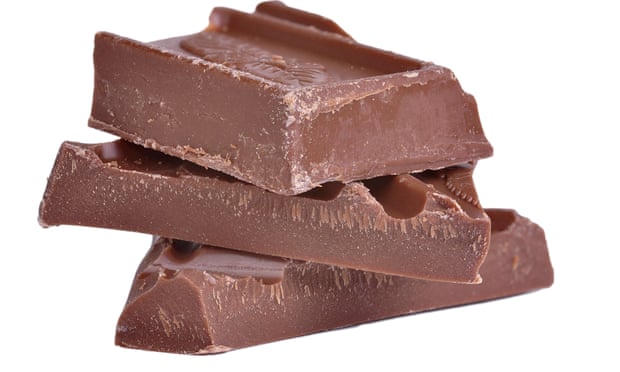
https://www.theguardian.com/lifeandstyle/2017/sep/20/is-chocolate-made-in-africa-i-should-cocoa
Post Brexit there may be more opportunity for Ghana to expand their chocolate brand beyond the local market because the UK will be able to renegotiate and create new deals. Hopefully if any deals are made they will help to boost not only Ghana's economy, but other African countries' economies as well. The added benefit of exporting this chocolate from Ghana is "the ecological bonus in that chocolate bars require much less transportation space than the beans that make them" (Tim Gossling, the guardian). In summation, by exporting chocolate from Ghana there will be an increased chance for improving the Ghana economy slightly, bettering the environment, and chocolate tastes so good.

https://www.theguardian.com/lifeandstyle/2017/sep/20/is-chocolate-made-in-africa-i-should-cocoa
Friday, September 15, 2017
The Admirable Women of Somaliland
Climate change is fueling humanitarian crises all over the world from Texas to Sierra Leone and people are coming together to help each other recover, but in Somaliland women are leading the charge.
Somaliland is located in northwest Somalia and is a "self-declared independent state" (Holly Miller, the guardian), which is suffering from the effects of a severe drought, like other East African countries. The drought in Somaliland has crippled many villages. As a result, women are emerging as leaders in a traditionally patriarchal society. Women are doing all they can to protect and provide for their community.
Women have come together in Gorgeysha, a small village, to form a coalition. Many of these women are illiterate and have been denied the right to education, and yet that has not stopped them from combining their effort and resources to not only care for themselves, but migrants too that have come from all over the region in desperate search for help.
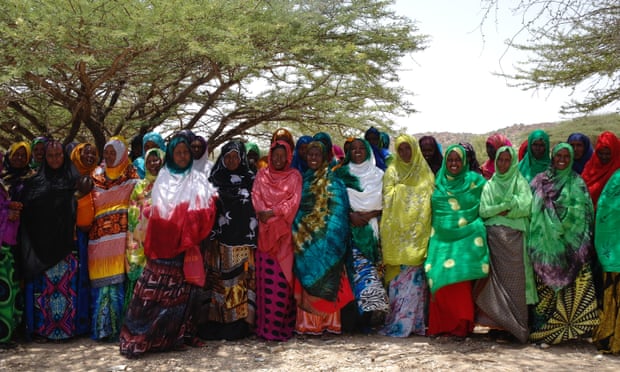
https://www.theguardian.com/commentisfree/2017/sep/08/somaliands-women-show-kindness-and-leadership-in-the-face-of-a-humanitarian-crisis
Somaliland is located in northwest Somalia and is a "self-declared independent state" (Holly Miller, the guardian), which is suffering from the effects of a severe drought, like other East African countries. The drought in Somaliland has crippled many villages. As a result, women are emerging as leaders in a traditionally patriarchal society. Women are doing all they can to protect and provide for their community.
Women have come together in Gorgeysha, a small village, to form a coalition. Many of these women are illiterate and have been denied the right to education, and yet that has not stopped them from combining their effort and resources to not only care for themselves, but migrants too that have come from all over the region in desperate search for help.

https://www.theguardian.com/commentisfree/2017/sep/08/somaliands-women-show-kindness-and-leadership-in-the-face-of-a-humanitarian-crisis
Wednesday, September 6, 2017
U.S. Warning to South Sudan
South Sudan is in desperate need of help and the civil war is not getting any better. Mark Green, the administrator for the Agency for International Development, has expressed that the United States policy towards South Sudan will be reevaluated. The article stated that Green did not elaborate on what he consequences of this review could be, but Green did say that "we (the U.S) support the people of South Sudan" (Carol Morello, The Washington Post). Since the outbreak of civil war between the government and opposition forces, civilians have suffered the most.
Millions of citizens have been displaced and are extremely food insecure. Soldiers from all sides loot homes and villages and make it extremely difficult for any humanitarian aid to reach the Sudanese people. According to the article, the U.S. has given South Sudan and it's neighbors "almost $730 million" (Carol Morello, The Washington Post) this year alone. Despite of that, "Africa's worst refugee crisis since the 1994 Rwandan genocide" (Carol Morello, The Washington Post) persists with no end in sight.
Link:
https://www.washingtonpost.com/world/africa/us-warns-south-sudan-continued-chaos-is-not-acceptable-aid-may-be-pulled/2017/09/02/a9b228bd-312f-4aed-8f4c-e3129442d568_story.html?utm_term=.9514e37c364b
Millions of citizens have been displaced and are extremely food insecure. Soldiers from all sides loot homes and villages and make it extremely difficult for any humanitarian aid to reach the Sudanese people. According to the article, the U.S. has given South Sudan and it's neighbors "almost $730 million" (Carol Morello, The Washington Post) this year alone. Despite of that, "Africa's worst refugee crisis since the 1994 Rwandan genocide" (Carol Morello, The Washington Post) persists with no end in sight.
Link:
https://www.washingtonpost.com/world/africa/us-warns-south-sudan-continued-chaos-is-not-acceptable-aid-may-be-pulled/2017/09/02/a9b228bd-312f-4aed-8f4c-e3129442d568_story.html?utm_term=.9514e37c364b
Wednesday, August 30, 2017
South Sudan Civil War
About a week ago I was watching the news and on the bottom of the screen I noticed a headline that mentioned the South Sudan and how millions of people have been displaced by the civil war. My first reaction was shock because I had no idea that there was even a civil war happening in South Sudan let alone that millions of people were suffering, so I decided to take this opportunity to learn a little bit more about this humanitarian crisis. I found an article in the New York Times which you can find here: https://www.nytimes.com/2017/08/17/world/africa/south-sudan-refugees-uganda.html?rref=collection%2Fsectioncollection%2Fafrica&action=click&contentCollection=africa®ion=stream&module=stream_unit&version=latest&contentPlacement=15&pgtype=sectionfront From this article I learned that every day refugees, mainly women and children, are flooding into Uganda to escape the ethnically motivated violence. I am in complete disbelief that this war has been going on for four years now and I am just learning about it now. I can't help but think; why does it take millions of people losing everything including their lives to get a mere mention on an American television news network?
Subscribe to:
Posts (Atom)